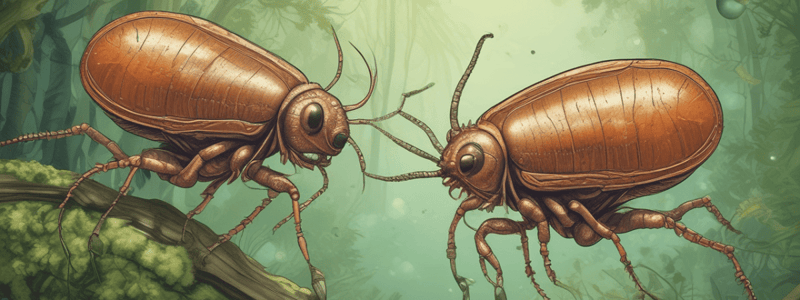Podcast
Questions and Answers
What is the shape of the adult Fasciolopsis buski?
What is the shape of the adult Fasciolopsis buski?
- Equipped with so-called shoulders (correct)
- Somewhat oblong
- Oval
- Pyriform
What feature is characteristic of the adult Fasciolopsis buski?
What feature is characteristic of the adult Fasciolopsis buski?
- Fleshy adult
- Protected by an outer layer of fine spines
- Tiny layer of scaly spines covers the organism
- Equipped with so-called shoulders (correct)
What is the shape of the egg of Fasciola hepatica?
What is the shape of the egg of Fasciola hepatica?
- Oval
- Somewhat oblong (correct)
- Pyriform
- Roundish
What is the size of the adult Fasciola hepatica?
What is the size of the adult Fasciola hepatica?
What is the shape of the Fasciolopsis buski eggs?
What is the shape of the Fasciolopsis buski eggs?
What is the size range of Fasciolopsis buski eggs?
What is the size range of Fasciolopsis buski eggs?
What is present in the eggs of Fasciolopsis buski?
What is present in the eggs of Fasciolopsis buski?
What is a characteristic feature of Fasciolopsis buski eggs?
What is a characteristic feature of Fasciolopsis buski eggs?
What is the drug of choice for treating Fasciolopsis buski infections?
What is the drug of choice for treating Fasciolopsis buski infections?
What is the mode of transmission for Fasciolopsis buski?
What is the mode of transmission for Fasciolopsis buski?
What is the diagnostic stage of Fasciolopsis buski?
What is the diagnostic stage of Fasciolopsis buski?
What is the intermediate host of Fasciolopsis buski?
What is the intermediate host of Fasciolopsis buski?
What is the definitive host of Fasciolopsis buski?
What is the definitive host of Fasciolopsis buski?
What is the treatment for Fasciolopsis buski infection?
What is the treatment for Fasciolopsis buski infection?
What is a common symptom of Fasciolopsis buski infection?
What is a common symptom of Fasciolopsis buski infection?
Study Notes
Characteristics of Trematodes
- Fasciola hepatica: 128-150 um by 60-90 um, somewhat oblong, with an undeveloped miracidium present
- Clonorchis sinensis: 78-120 µm long, 45-60 µm wide, somewhat oval, with a prominent operculum
- Schistosoma mansoni: 112-182 µm by 40-75 µm, oblong, with a developed miracidium large and lateral
- Fasciolopsis buski: 5 by 1.5 cm, somewhat oblong, fleshy adult, with an undeveloped miracidium present
- Heterophyes heterophyes: 1.5 by 0.5 mm, pyriform, with a tiny layer of scaly spines covering the organism
- Metagonimus yokogawai: 1 by 0.5 mm, pyriform, with tapering at the anterior end and rounding at the posterior end
- Paragonimus westermani: 1 by 0.7 cm, somewhat oval, with a prominent operculum
Life Cycle
- Infective stage: Free-swimming cercariae released from snail into water
- Definitive stage: Eggs shed from infected human
- Intermediate host: Freshwater snails
- Definitive host: Humans
Egg/Ova Characteristics
- Fasciolopsis buski: 128-140 um by 78-85 um, somewhat oblong, with an undeveloped miracidium present
- Fasciola hepatica: Undeveloped miracidium present, with distinct shoulders and a small knob opposite operculum
Symptoms and Complications
- Fasciolopsiasis: Abdominal discomfort, inflammation, and bleeding in the affected area, jaundice, diarrhea, gastric discomfort, edema, malabsorption syndrome, and intestinal obstruction
- Fascioliasis: Headache, fever, and chills, pain in the liver area, eosinophilia, jaundice, liver tenderness, anemia, diarrhea, and digestive discomfort
- Clonorchiasis: Fever, abdominal pain, eosinophilia, diarrhea, anorexia, epigastric discomfort, and occasional jaundice
- Heterophyiasis: Fever, abdominal pain, eosinophilia, diarrhea, anorexia, epigastric discomfort, and occasional jaundice
- Paragonimiasis: Cough, bloody diarrhea, eosinophilia, painful urination, and hematuria
- Complications: Nephrotic syndrome, bladder cancer, increased risk of Salmonella infections, and central nervous system involvement
Treatment
- Praziquantel: Effective against all trematodes
- Surgery: Necessary for patients in whom obstruction has occurred
Studying That Suits You
Use AI to generate personalized quizzes and flashcards to suit your learning preferences.
Description
Test your knowledge on the life cycle and characteristics of Fasciolopsis buski, a parasitic flatworm. Learn about the different stages of its life cycle, including cercariae and egg characteristics. Understand the hosts and vectors involved in its transmission.



